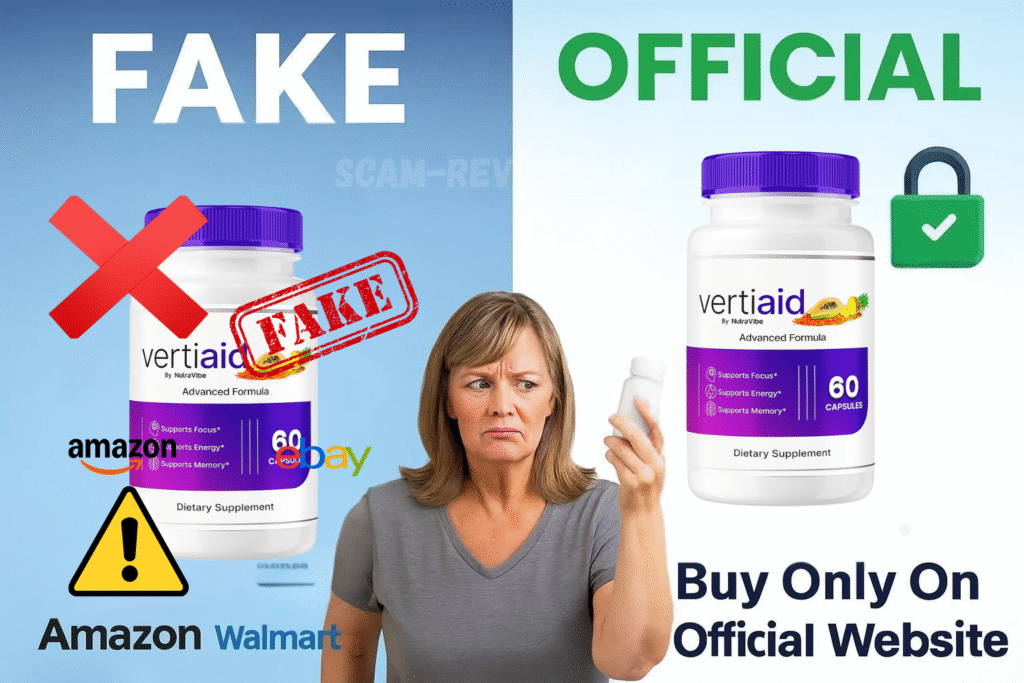VertiAid Reviews, Scam or Legit? What You Need to Know

Last Updated on 4 days ago by Supplement
VertiAid is a balance and vertigo support supplement that is aggressively promoted online and across social media platforms. The marketing behind VertiAid is filled with exaggerated promises and misleading claims, often targeting individuals struggling with dizziness, vertigo, inner ear problems, or age-related balance issues.
With so many balance and vertigo support supplements on the market, it’s natural to wonder if VertiAid is the real deal or just another overhyped product. Marketed as a supplement that supports inner ear health, improves balance, and reduces dizziness, VertiAid has caught the attention of many looking for natural relief from vertigo symptoms. But does it actually work? Let’s take a closer look.
What Does VertiAid Claim to Do?
VertiAid is designed to support balance and vertigo relief naturally by providing essential nutrients that help improve inner ear and neurological function. According to its makers, it can:
✔️ Improve Balance & Coordination – Helps stabilize your equilibrium and reduce unsteadiness.
✔️ Reduce Dizziness & Vertigo – Supports normal vestibular function for calmer, steadier movement.
✔️ Enhance Focus & Alertness – Clears mental fog that can accompany vertigo episodes.
✔️ Support Long-Term Inner Ear Health – Provides nutrients that promote ear and nerve health.
✔️ Contain Natural Ingredients – Free from synthetic additives, making it a safer choice for daily use.
What Are People Saying About VertiAid?
VertiAid has received mostly positive reviews, but experiences vary from person to person:
✅ Reduced Dizziness – Users report feeling less lightheaded and more stable.
✅ Better Balance & Coordination – Many say they can move more confidently without fear of imbalance.
✅ Enhanced Mental Clarity – Users notice improved focus and alertness during daily tasks.
✅ No Major Side Effects – Most people tolerate it well, with only occasional mild digestive discomfort.
However, some users don’t notice immediate changes, which is common with any supplement. Factors like diet, stress, sleep, and severity of vertigo can affect results.
Why VertiAid Is Not a Scam
It’s normal to be skeptical, especially when it comes to vertigo supplements. However, VertiAid appears to be a legitimate product for several reasons:
✅ Transparent Ingredients – Uses well-researched, natural components known for inner ear and neurological support.
✅ Positive User Reviews – Many real users report noticeable improvements in balance, dizziness, and focus.
✅ No False Promises – Marketed as a supportive supplement, not a miracle cure.
✅ Available From Trusted Sources – You can purchase it from official websites and reputable retailers, avoiding shady third-party sellers.
Final Thoughts: Is VertiAid Worth Trying?
VertiAid is NOT a scam — it’s a legitimate supplement that may help support balance, reduce dizziness, and improve overall inner ear health when combined with a healthy lifestyle and proper self-care. However, it’s not a miracle cure and should not replace medical advice or prescribed treatments. Maintaining a balanced lifestyle — including proper nutrition, stress management, and inner ear exercises — combined with the right supplement can make a real difference in supporting long-term balance and vertigo relief.
Where to Buy VertiAid

To ensure authenticity and avoid counterfeit products, purchase VertiAid only from the official website or verified online retailers. Buying directly from the manufacturer also allows you to access discounts, bundle offers, and money-back guarantees.
The promoters of VertiAid rely heavily on questionable endorsements, including a vague doctor or health expert featured in long-form promotional videos who claims the supplement can stabilize balance, relieve vertigo symptoms, and improve overall mobility — all through a proprietary blend of “natural” ingredients. However, independent research reveals no credible scientific studies, clinical trials, or peer-reviewed evidence to support these assertions. The product is sold with transformational claims and urgent discounts, but these are unsupported by legitimate medical science.
Additionally, the official VertiAid website displays logos from respected health institutions like WebMD, PubMed, and the Mayo Clinic, implying a connection that does not exist. There is no record of VertiAid being clinically reviewed or endorsed by any of these platforms. The website also uses manipulative pricing strategies, luring customers in with a low introductory offer before inflating the cost through recurring charges, forced bundles, and upsells. Many testimonials appear only on affiliate-run blogs or promotional landing pages, rather than verified, independent review platforms.
How the VertiAid Scam Works: Step-by-Step Breakdown
Step 1: Clickbait Ads & Emotional Triggers
VertiAid is advertised through paid ads on platforms like Facebook and Instagram. Ads feature exaggerated claims, fake endorsements, and stories such as:
- “Seniors are regaining balance in just days with this secret formula!”
- “Doctors shocked by this one natural ingredient…”
These ads exploit fears of falling, dizziness, and age-related decline to attract potential buyers.
Step 2: Fake News-Style Landing Page
After clicking, users land on a professionally designed page disguised as a news article or health investigation. These pages typically contain:
- AI-generated testimonials
- Deepfake-style videos
- Claims that pharmaceutical companies are trying to “suppress” this solution
- Links to “limited-time” offers with heavy discounts
Step 3: Fake Urgency and Scarcity
Once on the product page, users see:
- Countdown timers
- “Only 5 bottles left!”
- “Offer expires in 15 minutes!”
These artificial scarcity tactics push consumers to purchase without verifying claims.
Step 4: Hidden Subscription Terms
Users may think they are making a one-time purchase, but fine print often enrolls them in a monthly auto-billing program. Many only realize this after multiple deductions appear on their accounts.
Step 5: Product Delivery (or Not)
Some customers report receiving bottles with vague labeling and no safety seals, while others never receive the product at all. Even those who do often report minimal or no improvement.
Step 6: No Refund, No Support
Attempts to cancel or request a refund are frequently met with:
- Non-working phone numbers
- Ignored emails
- Refunds delayed or denied
The advertised “money-back guarantee” is virtually impossible to claim.
Step 7: Reuse of Buyer Data
Some users report being targeted again with the same supplement under a new name, suggesting customer data is being resold to other marketers.
Key Red Flags
Unverified Expert Endorsements
VertiAid marketing features commentary from a supposed medical or vertigo specialist whose credentials cannot be verified. This creates a false sense of authority.
Fabricated Testimonials and Reviews
The website displays glowing testimonials claiming dramatic relief, yet independent platforms like Trustpilot, Reddit, or Amazon show few verified reviews.
Misleading Website Claims
Trust badges like “Doctor Recommended,” “Clinically Proven,” and “100% Natural” are visually prominent but unverified.
Exaggerated Health Claims
Marketing claims VertiAid can “cure vertigo,” “restore perfect balance,” and “eliminate dizziness instantly,” none of which are supported by credible clinical evidence.
Questionable Website Quality and Redirects
Advertisements often redirect through multiple pages to long-form sales videos designed to obscure product details.
Misleading Use of Fake Endorsements
Sales videos include a “doctor” praising VertiAid, yet their identity cannot be traced to any verified medical board, academic institution, or professional network.
Dubious Purchase Offers and Pressure Tactics
Buyers face “today only” deals, countdown timers, and low-stock alerts to push impulsive purchases while hiding recurring charges in fine print.
What to Do If Scammed
Stop Further Transactions
Immediately contact your bank or credit card provider to report unauthorized charges and request a chargeback.
Report the Fraud
File a complaint with authorities like the FTC (reportfraud.ftc.gov), BBB (www.bbb.org), or your local consumer protection office.
Take Screenshots
Document the website, emails, receipts, and all communication for evidence.
Consult Legal Advice
If substantial funds were lost, consider a consumer rights attorney. Some scams may be subject to class action suits.
Share Your Experience
Warn others via social media, review platforms, and scam-reporting websites.
Conclusion
If you are considering VertiAid, proceed with extreme caution. The supplement is surrounded by exaggerated claims, fake endorsements, deceptive marketing tactics, and fabricated testimonials. No reliable scientific evidence supports the promises made, and the company’s lack of transparency raises serious red flags.
Always consult a licensed medical professional before trying balance or vertigo supplements. Real results come from verified science, not miracle pills or aggressive online marketing funnels.
Frequently Asked Questions (FAQ) About VertiAid
Is VertiAid a legitimate vertigo supplement?
No. It lacks clinical evidence, verified results, and scientific validation.
Does VertiAid have FDA approval?
No. The FDA does not approve dietary supplements.
Are VertiAid customer reviews real?
Most positive reviews appear scripted or hosted on promotional pages. Verified reviews are rare.
Can VertiAid cause side effects?
No studies confirm safety. Some users report headaches, nausea, or digestive issues.
What’s the biggest red flag about VertiAid?
Lack of transparency—no verifiable company address, limited customer support, and vague refund policies.
Why isn’t VertiAid available on Amazon or Walmart?
Major retailers require transparency and verified business practices, which this supplement does not provide.
How does the VertiAid subscription trap work?
Hidden fine print enrolls buyers in recurring auto-renewals that are difficult to cancel.
What should I do if I bought VertiAid by mistake?
Contact your bank for a chargeback, report the product to the FTC, and monitor accounts for recurring charges.